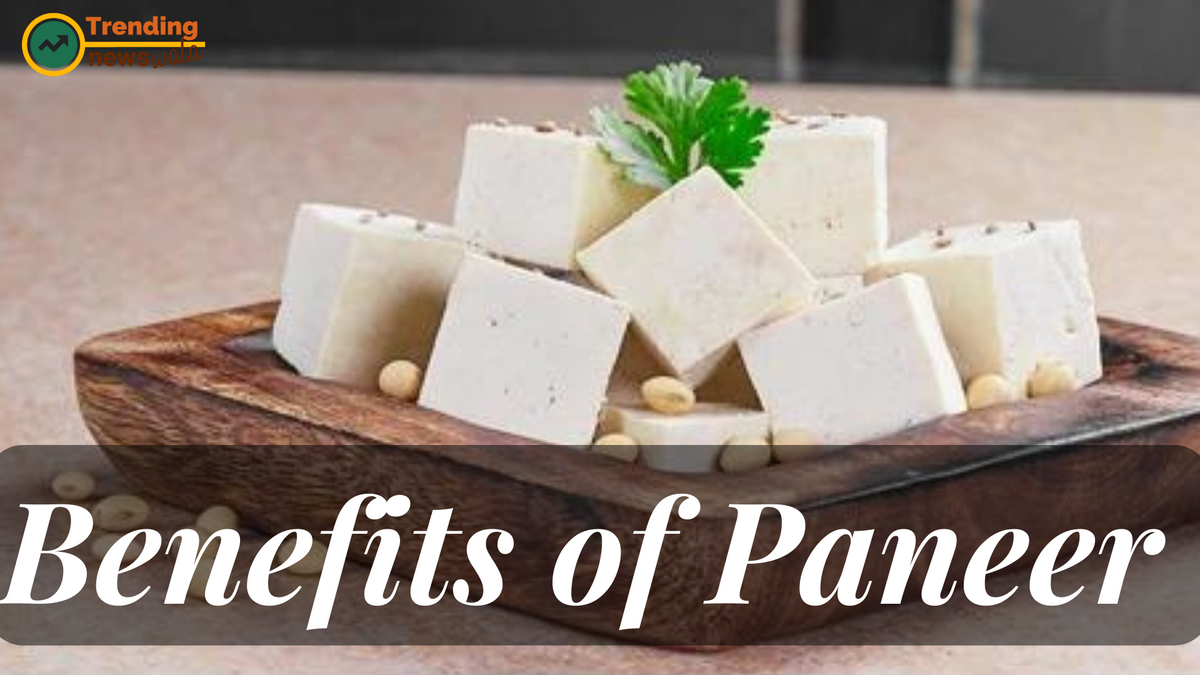10 Benefits of Paneer

Paneer is a type of fresh cheese that is commonly used in Indian cuisine. It is a non-aged, non-melting cheese that is made by curdling milk with an acidic ingredient such as lemon juice, vinegar, or yogurt. The curd is then drained and pressed to remove excess moisture, resulting in a firm, creamy white cheese with a mild, slightly tangy flavor.
Paneer is a versatile ingredient that can be used in a wide variety of dishes, both savory and sweet. It is often cubed and used in curries, stir-fries, and wraps, or crumbled and used as a topping for salads and pizzas. It is also a popular ingredient in Indian desserts such as ras malai and sandesh. Paneer is high in protein and calcium and is a good source of healthy fats, making it a nutritious addition to a balanced diet.
What Are the Top Health Benefits of Paneer?
Paneer, a type of fresh cheese commonly used in Indian cuisine, is a nutritious food that offers several health benefits. Here are 10 of the top health benefits of paneer:
1. Rich in Protein: Paneer is a good source of protein, which is essential for building and repairing tissues in the body.
2. Helps with Weight Management: Paneer is low in calories and high in protein, which can help keep you feeling full for longer periods and reduce your calorie intake.
3. Good for Bone Health: Paneer is rich in calcium and phosphorus, which are important for maintaining strong and healthy bones.
4. Helps in Muscle Building: Paneer is rich in casein protein, which is slow digesting and provides a steady supply of amino acids to muscles, making it an excellent food for muscle building.
5. Boosts Immune System: Paneer is rich in zinc, which is important for immune system function, wound healing, and DNA synthesis.
6. Good for Heart Health: Paneer is a good source of conjugated linoleic acid (CLA), which can help reduce inflammation, lower cholesterol levels, and improve heart health.
7. Good for Diabetics: Paneer is low in carbohydrates and high in protein, making it a good food option for people with diabetes.
8. Improves Digestion: Paneer is rich in probiotics, which help improve digestion, strengthen the immune system, and prevent gastrointestinal disorders.
9. Promotes Hair and Skin Health: Paneer is rich in biotin, which is important for healthy hair, skin, and nails.
10. Reduces the Risk of Cancer: Paneer contains sphingolipids, which have been found to have anti-cancer properties and may help reduce the risk of cancer.
What Are the Nutritional Values of Paneer?
Paneer is a nutrient-dense food that offers several important vitamins and minerals. Here are some of the nutritional values of paneer per 100 grams:
- Calories: 265 kcal
- Protein: 18.3 g
- Fat: 20.8 g
- Carbohydrates: 2.7 g
- Calcium: 208 mg
- Phosphorus: 183 mg
- Zinc: 1.4 mg
- Vitamin B12: 0.4 μg
- Riboflavin (Vitamin B2): 0.4 mg
Paneer is a rich source of protein, which is essential for building and repairing tissues in the body. It is also high in calcium and phosphorus, which are important for maintaining strong and healthy bones. Paneer is also a good source of vitamin B12, which is important for nerve function and DNA synthesis, and riboflavin (vitamin B2), which helps convert food into energy. Additionally, paneer is a good source of healthy fats, which are important for maintaining overall health and wellbeing.
How to Include Paneer in Your Daily Diet?
Paneer is a versatile ingredient that can be included in a variety of dishes to make them more nutritious and flavorful. Here are some ways to include paneer in your daily diet:
1. Paneer Curry: Paneer curry is a popular dish in Indian cuisine that is easy to prepare and delicious. You can make it with a variety of spices, vegetables, and sauces to create a different flavor each time.
2. Paneer Bhurji: Paneer bhurji is a dish made with scrambled paneer, vegetables, and spices. It can be served as a side dish or as a filling for wraps and sandwiches.
3. Paneer Paratha: Paneer paratha is a type of Indian flatbread that is stuffed with a mixture of paneer, vegetables, and spices. It is a filling and nutritious meal that can be eaten for breakfast, lunch, or dinner.
4. Paneer Salad: Paneer can be crumbled and used as a topping for salads to add protein and flavor. You can also add other vegetables, nuts, and seeds to create a nutritious and satisfying meal.
5. Paneer Sandwich: Paneer can be used as a filling for sandwiches and wraps to add protein and flavor. You can also add vegetables, sauces, and spices to create a unique and delicious sandwich.
6. Paneer Dessert: Paneer is often used in Indian desserts such as ras malai and sandesh. You can also make a healthy dessert by mixing paneer with fruits, nuts, and honey.
7. Paneer Snacks: Paneer can be used to make a variety of healthy snacks such as paneer tikka, paneer cutlets, and paneer popcorn. These snacks are high in protein and low in calories, making them a healthy option for snacking.
Remember to balance your paneer intake with other nutrient-rich foods to ensure you are getting a well-rounded diet.
What Are the Side Effects of Overeating Paneer?
While paneer is a nutritious food, overeating it can lead to several side effects. Here are some of the potential side effects of overeating paneer:
1. Weight Gain: Paneer is a high-calorie food that can contribute to weight gain if consumed in excess.
2. Digestive Issues: Overeating paneer can lead to digestive issues such as bloating, gas, and diarrhea. This is because paneer is high in fat and can be difficult to digest in large quantities.
3. Increased Cholesterol Levels: Paneer is high in fat and cholesterol, which can contribute to increased cholesterol levels in the blood if consumed in excess.
4. Kidney Problems: Overeating paneer can put a strain on the kidneys, especially in people who have existing kidney problems. This is because paneer is high in protein, which the kidneys must process and eliminate from the body.
6. Increased Risk of Heart Disease: Overeating paneer can lead to an increased risk of heart disease due to its high fat and cholesterol content.
7. Nutrient Imbalances: Overeating paneer can lead to imbalances in nutrient intake, as it is high in protein and fat but low in other essential nutrients such as fiber and vitamins.
It's important to consume paneer in moderation as part of a balanced diet to avoid these potential side effects.
Who Should Avoid Eating Paneer?
Paneer is generally safe to eat for most people, but there are some groups of people who should avoid or limit their intake of paneer. Here are some of those groups:
1. Lactose Intolerant People: Paneer is made from milk, which contains lactose, a type of sugar that some people cannot digest properly. Lactose intolerant people may experience digestive symptoms such as bloating, gas, and diarrhea if they consume paneer.
2. People with High Cholesterol: Paneer is high in fat and cholesterol, which can contribute to increased cholesterol levels in the blood. People with high cholesterol should limit their intake of paneer or choose low-fat versions.
3. People with Kidney Problems: Paneer is high in protein, which can put a strain on the kidneys. People with kidney problems may need to limit their intake of paneer or choose low-protein versions.
4. People with Dairy Allergy: Some people may be allergic to dairy products, including paneer. These people should avoid consuming paneer or any other dairy products.
5. Infants and young children: Infants and young children should avoid consuming paneer as it is high in protein and may not be suitable for their developing digestive systems.
If you belong to any of these groups, it's best to consult with a healthcare professional or registered dietitian before including paneer in your diet.





